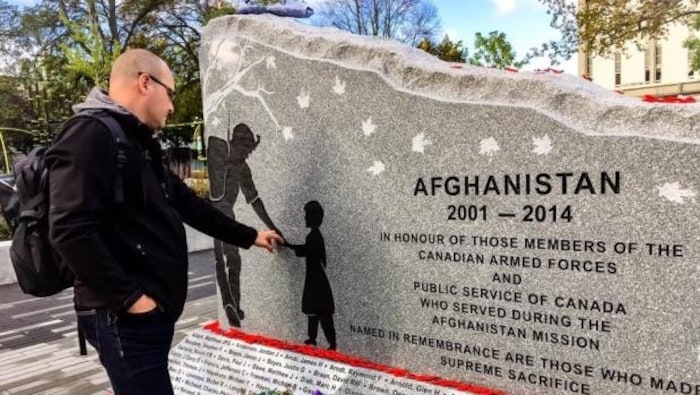Open in full screen mode The mission of Canadian soldiers in Afghanistan ended on March 12, 2014. Radio-Canada The speech synthesis, based on artificial intelligence, allows the generation of spoken text from written text. March 12, 2014, Canada concludes his military mission in Afghanistan. This withdrawal puts an end to one of the longest Canadian military interventions abroad. The Canadian mission in Afghanistan is therefore officially over. It was the most important since the end of the Second World War and the deadliest since the Korean War. A quote from Céline Galipeau Report by parliamentary correspondent Emmanuelle Latraverse who offers an assessment of the Canadian military mission in Afghanistan. On March 12, 2014, the last day of the official presence of Canadian soldiers in Afghanistan, the anchor of Téléjournal recalled the importance that the mission in this country had for the army and the Canadian population. The report by the parliamentary correspondent in Ottawa, Emmanuelle Latraverse, provides a brief assessment of the results of a military mission which aimed at the pacification and stabilization of Afghanistan. Loading ELSEWHERE ON NEWS: Justin Trudeau: “I think about quitting every day! »Loading ELSEWHERE ON NEWS: Justin Trudeau: “I think about quitting every day! » We understand that this assessment is nuanced when listening to the comments of the former Canadian ambassador to Afghanistan, Chris Alexander, and the former federal minister John Manley interviewed by Emmanuelle Latraverse. The images in Emmanuelle Latraverse's report confirm that the Afghan capital, Kabul, protected by barbed wire and fortified areas, is a city where the war continues to rage. “There are going to be car bombings, there are going to be killings,” predicts Chief of Staff General Thomas J. Lawson as Canadian soldiers lower the maple leaf in Kabul. The toll is also 158 Canadian soldiers and seven civilians who were killed during the mission and a bill that rises to more than 11 billion dollars, recalls the parliamentary correspondent. A large number of Afghanistan veterans also suffer from post-traumatic stress disorder. Let us recall the reason for the existence of this Canadian mission. On September 11, 2001, the Al-Qaeda network carried out terrorist attacks in the United States. On October 7, 2001, an international coalition invaded Afghanistan to eradicate the Al-Qaeda network and the Taliban regime that welcomed it on its territory. Canadian soldiers participate in this multinational military campaign. In 2002, after the defeat of the Taliban, another phase of the intervention in Afghanistan began. The mandate of the Canadian military deployed there aims to stabilize and rebuild the country ravaged by decades of war. But the mission turns out to be much more complex than anticipated, due to the fierce resistance of the Taliban fighters who want to regain power. Two reports describe the numerous difficulties and dangers that awaited the Canadian mission. 
Justin Trudeau: “I think about quitting every day!”
Justin Trudeau: “I think about quitting every day!”
Also read:
At the summer 2003, as recalled by journalist Paul Gascon in a report presented on July 19, 2003 to Téléjournal,the Canadian mission is part of the International Security Assistance Force in Afghanistan (ISAF).
Canadian soldiers then take over from their colleagues Germans in the command of the Kabul brigade which is the main ISAF base.
The role of this brigade is to help form an army Afghan national security and to restore peace in Kabul and its periphery.
The mission turns out to be dangerous. The Kabul brigade was the subject of car bomb attacks.
In June 2003, four German soldiers were killed by the Taliban.
On February 12, 2004, journalist Michel Cormier presented at the Téléjournal/Le Pointan interview granted to him by the head of the Canadian mission, Major General Andrew Leslie.
The officer's comments confirm the multiple dangers facing the mission, as well as the dedication of the approximately 40,000 Canadian soldiers deployed in Afghanistan while throughout its existence.
A few days after the end of the mission, the 93 Canadian soldiers who remained in Afghanistan returned home.
Report by journalist Marc Godbout on the return of the last soldiers deployed in Afghanistan.
As recalled in this report by journalist Marc Godbout presented to the Téléjournalon March 18, 2014, they were welcomed by their families who were both relieved and proud of their accomplishments.
Canadian Prime Minister Stephen Harper is at the Ottawa military airport to receive them.
The head of the federal government congratulates the soldiers for the work accomplished in Afghanistan.
He admits, however, that not all of the mission's objectives were achieved.
Afghanistan still has a long way to go before becoming a full democracy, concedes Stephen Harper.
The Prime Minister, however, does not hesitate to affirm that the participants in the mission in Afghanistan are heroes.
This is why he decided to designate by Royal Proclamation a National Day of Honor on May 9, 2014, in recognition of the work accomplished by Canadian soldiers in Afghanistan.
Start of widget. Skip widget?End of widget. Return to start of widget?

